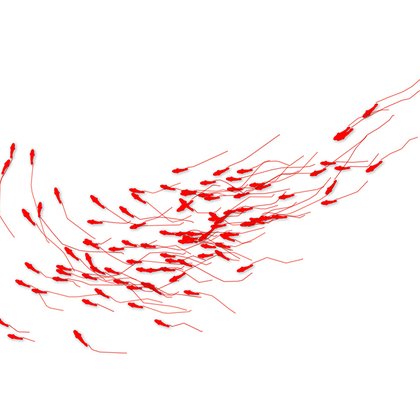
Nicholas Coles, PhD
@coles_nicholas_
Followers
6K
Following
7K
Media
287
Statuses
3K
Assistant Professor at the University of Florida Quant | Emotion | Team Science
Gainesville, FL
Joined August 2017
⚠️New paper at Nature Human Behaviour⚠️ Can posed smiles make people feel happier? In a global adversarial collaboration, we found overwhelming support for this controversial hypothesis. But we couldnt resolve one thing: concerns about a popular pen-in-mouth smiling task. 🧵
15
158
535
I’m thrilled to share that the Second Edition of The Book of Why will be released at the end of this year. It will include brief discussions of recent breakthroughs in causal inference, as well as some aspects of LLMs. Join me on this next journey into the land of causality —
21
79
535
New 📰 Demand characteristics are a fundamental methodological concern in research with humans Yet little is known about the direction, magnitude, and consistency of these effects In this new paper, we take stock of what we’ve learned via meta-analysis https://t.co/ycCDV2uD5O
online.ucpress.edu
Demand characteristics are a fundamental methodological concern in experimental psychology. Yet, little is known about the direction, magnitude, and consistency of their effects. We conducted a...
0
2
14
🚧 New paper 🚧 Big team science reveals promises and limitations of machine learning efforts to model the physiological basis of affective experience https://t.co/IHwjaF1AY0 🧵 on what we found, why we think it's important, and future directions
royalsocietypublishing.org
Researchers are increasingly using machine learning to study physiological markers of emotion. We evaluated the promises and limitations of this approach via a big team science competition. Twelve...
1
2
5
To wrap up Without big team science, Im not sure if I would have ever fully understood the methodological challenges of understanding emotion via machine learning And without more of these big team efforts, I think it will take a long time for these challenges to be overcome 😅
0
0
0
An alternative is to not expect individual researchers to magically do more, but instead encourage them to coordinate & collaborate This big team science approach is used to tackle many tough issues, like mapping the human genome or imaging a black hole https://t.co/GpA6MFttKN
1
0
0
𝗙𝘂𝘁𝘂𝗿𝗲 𝗱𝗶𝗿𝗲𝗰𝘁𝗶𝗼𝗻𝘀 Researchers could perform extensive robustness checks Build a lot of models in a lot different ways and examine their performance from a lot of different angles However, we might see that such an approach isn’t really feasible for many
1
0
0
This is humbling If Paper A claims to have found universal physiological indicators of emotion, you can reasonably expect that Paper Z will eventually come out with a different conclusion. And those two papers may be very difficult to compare. So what can we do? 🤔
1
0
0
E.g., Paper A uses a specific dataset, architecture, and approach to training/testing/evaluation Paper B makes totally different decision about each one of these issues And this leaves us with puzzle pieces that can’t even really be connected 🧩
1
0
0
E.g., Paper A uses a specific dataset, architecture, and approach to training/testing/evaluation Paper B makes totally different decision about each one of these issues And this leaves us with puzzle pieces that can’t even really be connected 🧩
1
0
0
The implications of decisions about architecture, training, testing and evaluation are *interactive* Across publications, ppl make a very different looking set of decisions Without exploring the impact of those decisions, they come away with only a single piece of the puzzle
1
0
0
Things are more erratic when you look at all models Inferences about the accuracy and theoretical implications of machine learning efforts depended not only on their architecture, but also how they were trained, tested, and evaluated 😵💫
1
0
0
Some models were very inconsistent with notions of universality [e.g., see purple line] They performed much better when tested on the same [black arrow] vs. different [grey arrow] people But other models yielded the exact opposite conclusion [see red line] 😂
1
0
0
If machine learning can uniquely capture links between physiology and emotion, perhaps it can tackle difficult theoretical questions E.g., are these links universal? Perhaps that could be tested by seeing how well models perform when tested on the same (vs. different) people
1
0
0
Beating a baseline that relied on simple averaging in 46% of tests is interesting in itself. That baseline is a simple/classical statistical method 😅 But, of course, this shouldn't stop researchers from trying to explore the power of these newer machine learning methods
1
0
0
𝗢𝘂𝗿 𝗯𝗶𝗴 𝘁𝗲𝗮𝗺 𝘀𝗰𝗶𝗲𝗻𝗰𝗲 𝗮𝗽𝗽𝗿𝗼𝗮𝗰𝗵 12 machine learning teams competed to predict affect using multiple measures of peripheral nervous system activity (e.g. heart rate) We tested the models in 4 ways & made everything openly available
1
0
0
Reference for the “$20 billion industry” claim: https://t.co/dDmg0lJlq4
washingtonpost.com
Artificial intelligence advanced by such companies as IBM and Microsoft is still no match for humans.
1
0
0
The complexity has spurred enormous interest in machine learning & AI It's a $20+ billion industry And many people hope that this may unveil secrets about how emotions work E.g., whether everybody experiences emotion the same way -- i.e., have similar "emotional realities"
1
0
0
Experiments, though, may never yield a *complete* understanding of links between physiology and emotional experience There are a lot of physiological signals to consider. And their relationship with emotional experience may too complex for simple methods and models
1
0
0
The idea that emotion has a physiological basis is often supported by simple experiments When you manipulate what’s going in the body, people often report changes in their emotion E.g., https://t.co/kF9COdIMJD
nature.com
Nature Human Behaviour - In this Stage 2 Registered Report, Coles et al. present the results of a multicentre global adversarial collaboration on the facial feedback hypothesis.
1
0
0
𝗕𝗮𝗰𝗸𝗴𝗿𝗼𝘂𝗻𝗱 A lot of emotion researchers believe that emotion has a *physiological basis*. Our hearts race, our muscles tighten, our body temperatures change Maybe those sensations are what we are referring to when we say we’re *feeling* emotional
1
0
0



